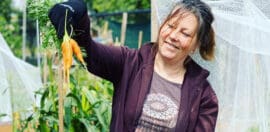Making a beeline to edible bugs

22 February 2023 at 10:03 am
Tapping into the $4 billion global edible insect market could offer a solution to the climate, economic and employment crises facing Australia.
For many people, seeing, touching and even thinking about bugs can make our skin crawl. Entomophobia, a fear of insects, is a common phobia and it’s easy to understand why – they bite, squirm and infiltrate our personal space.
But insects are crucial to our food systems, and eating them may offer a solution to mitigating the effects of climate change and supporting sustainable agriculture.
Advocating for the benefits of insect consumption has been the mission of Skye Blackburn for the past 15 years. The food scientist, entomologist and founder of Circle Harvest, a purpose-led company running Australia’s first and largest insect protein farm, has seen the appetite for edible bugs grow over time.
“I could see the changes that need to be made within our food system, [but] at the time, people were like it’s either revolutionary or she’s crazy.
“We’ve spent the past 15 years educating people about the importance of diversification and sustainability within our food system to feed our growing population,” said Blackburn, referencing the over 1.3 million Australian students that have participated in the company’s school incursion program since 2007.
It’s a far cry from when Circle Harvest first launched, where a public lack of understanding and engagement created what Blackburn describes as a “force field” around the company. Today, its large following readily purchases the superfood in the form of pasta, corn chips, candy, granola and protein powder.
“People’s perception around insect-based foods has really changed. We’re eating less meat, we’re eating more plant-based diets, and we’re looking at alternative sustainable proteins.
“Things are just getting bigger and bigger for insect proteins in Australia because people are wanting nutrient-dense, healthy, sustainable foods – and insect proteins really do tick all the boxes.”
Feeding the future
The popularity of insect proteins has grown to create a competitive market, and while Circle Harvest continues to lead the pack on human consumption, several companies are now using bugs in pet food, aquaculture, fertilisation and waste management.
“Insects are actually really versatile within our food system, we can do lots and lots of different things with them. There are a lot of farms that are coming up now that are focusing on key areas within our food system where we need help and insects are really part of the solution,” said Blackburn.
By 2050, we will need to produce 60 per cent more food to feed almost 10 billion people, according to Australia’s National Protein Roadmap, produced by CSIRO in partnership with government and key stakeholders. Currently, 75 per cent of the world’s food is produced from just five animals and 12 plants, leaving our food system particularly vulnerable to the effects of climate change.
Head of CSIRO’s Future Protein Mission Crispin Howitt said tapping into the over 2,000 species of edible insects offers a critical opportunity for Australia’s employment and economic growth.
“While Australia’s traditional protein industry, such as red meat, will continue to maintain the largest market share… growing the complementary protein industry, including new plant-based products, precision fermentation and insect protein sources… will create new jobs and export opportunities for Australia,” Howitt told Pro Bono News.
The global edible insect market is estimated to be worth $4.3 billion in 2025, yet there are just 14 insect-based businesses operating in Australia at the moment. According to Howitt, using insects specifically for animal feed is one avenue for Australian companies to best compete in the global market.
“For insects as a protein source, the area of most promise in Australia is for animal feed. This emerging industry is negligible in size today, but estimates show it could be worth $32 million by 2030,” continued Howitt.
“Many countries, including Singapore, are investing heavily into the development of new protein products. Australia is well positioned to capitalise on the growing protein opportunity and become a global leader through developing new differentiated protein products, as well as growing established products and markets in the protein sector more broadly.”
Environmentally, the impacts are also evident. Replacing a weekly meat-based dinner with one that uses crickets as the source of protein saves over 100,000 litres of drinking water each year – about four swimming pools full – according to Blackburn. It also produces about 1/100th of the amount of carbon dioxide and relies on dramatically less animal feed as traditional livestock.
Securing wider support
But while the benefits of edible insects are clear, Blackburn has been shocked by the lack of government support to diversify Australia’s food system and better address sustainability, which has only just started to take effect.
Most recently, the topic made national headlines through the awarding of the 2023 ACT Australian of the Year to Olympia Yarger, founder of the Insect Protein Association of Australia and agritech start-up Goterra, which uses maggots to process food waste and reduce greenhouse gases.
“We haven’t received very much help from the government, and they really took quite a long time to notice that there was an issue with our food system. They’ve started to put things in place now, which is fantastic, but they’re late to the game,” said Blackburn.
“Up to now, it’s been a few very passionate individuals and start-ups that have been pushing forward with sustainable foods in Australia. They’ve been… working on this problem for a very long time, and they are basically going to be the people that are helping to produce enough food to feed our population.”
Do you value our content?








The lack of government support to diversify Australia’s food system and better address sustainability has also been noticed in the area of regenerative farming. Might have something to do with the big brands which have a grip on the industry …. ???